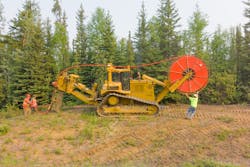Vero Networks positions fiber cables for connectivity, earthquake detection, healthcare
As new subsea cables land on the coast of California, companies such as Vero Networks are building fiber infrastructure inland to bring the new connectivity to more places, including traditionally underserved areas, and to further government broadband initiatives. In particular, Vero Networks reports that it has been busy constructing fiber networks around the north, east, and west sides of Arcata Bay and in the City of Arcata.
This connectivity is now available in the Arcata area -- and California's third Polytechnic University, Cal Poly Humboldt, which is located there, has wasted no time putting the new network and its capabilities to work.
Gaining ground on the future of earthquake detection via fiber cabling technology, Cal Poly Humboldt, USGS, UC Berkeley, University of Washington, Cal Tech, Vero Networks, OptaSense Inc., and city and county governments, including the Arcata Police Department, who are housing crucial equipment, announced that they are now working together on leveraging fiber-optic cables to detect and understand earthquakes and other geologic hazards.
Fiber-optic cables can detect changes in the earth during earthquakes. The researchers are investigating just how the optic parameters of the cable change when shaken by an earthquake.
With the cooperation of the county, city of Arcata, PG&E and local landowners, these researchers installed about 50 seismometers, instruments that respond to ground noises and movement, along the new line. They are conducting a multi-month evaluation of the line, detecting even the smallest earthquakes that occur on a daily basis within our highly seismic area.
Connie Stewart, executive director of initiatives for Cal Poly Humboldt, commented:
"We are grateful for these partnerships. There are many scientific and environmental opportunities that will directly benefit from this new infrastructure. In addition to studying the most seismically active location in the lower 48 states, we can study the impact of sediment moving from mountains to the sea, traffic pattern impacts, and migration patterns of offshore Marine life."
Fiber-optic cable to support healthcare education and rural broadband
Meanwhile, Vero Networks is also further supporting educational networks by building fiber-optic cable towards a state-of-the-art learning lab focused on the development of a healthcare workforce in Northern California. This project will support the State of California's $10 million dollar investment to convert a 30,000 square foot warehouse into a healthcare education hub. This historic investment will help grow healthcare career programs at both Cal Poly Humboldt and College of the Redwoods.
Finally in 2023, Vero Networks announced it will begin construction of the Digital 299 route from Arcata (along hwy 299) to Redding, California, bringing fiber-optic network services along a corridor that has traditionally been underserved or unserved with broadband.
Pam Moore, CEO of Vero Networks, concluded:
"While the first segment of this network has only been active for less than a year, we are starting to get a view into the breadth of the possible benefits that the fiber network will bring to the area. We are optimistic that we will continue to have a positive impact in the Arcata area and also support the communities along the Highway 299 corridor."
For more information, visit https://www.veronetworks.com.
For more news, projects, and profiles in the ICT cabling and connectivity sphere, subscribe to the CI&M newsletter and follow us on LinkedIn, Twitter, and Facebook.
About the Author
Matt Vincent
Senior Editor
Matt Vincent is a B2B technology journalist, editor and content producer with over 15 years of experience, specializing in the full range of media content production and management, as well as SEO and social media engagement best practices, for both Cabling Installation & Maintenance magazine and its website CablingInstall.com. He currently provides trade show, company, executive and field technology trend coverage for the ICT structured cabling, telecommunications networking, data center, IP physical security, and professional AV vertical market segments. Email: [email protected]

